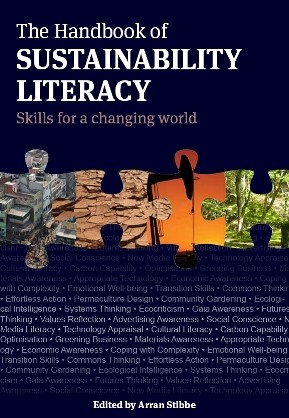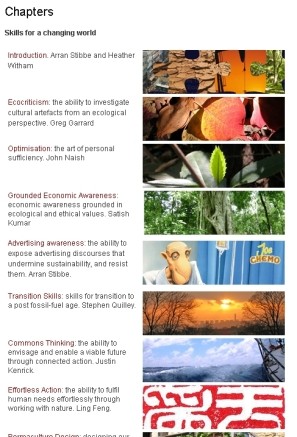An important new educational resource was launched on September 18th, 2009 T...
An important new educational resource was launched on September 18th, 2009
The Handbook of Sustainability Literacy takes a sharp look at the skills, attributes and competencies that learners will need for surviving and thriving in the 21st century.It is a free multimedia resource with interviews and chapters by more than forty educators (see www.sustainability-literacy.org) as well as a paperback book.
The handbook is critical of some mainstream skills agendas which focus narrowly on skills for industrialisation and economic expansion at all costs, and instead promotes a more open-ended approach including abilities such as values reflection, ecological intelligence, and critical awareness of the social structures that underpin unsustainable societies.
The authors include leading sustainability educators as well as specialists from a wide range of disciplines from engineering to art, and the resource will be useful for lecturers, teachers and students across all study areas.
The project was funded by the Higher Education Academy Education for Sustainable Development Project and conducted by the Environmental Association of Universities and Colleges in partnership with the University of Gloucestershire Centre for Active Learning, the University of Brighton and the UNU RCE (Severn).
The paperback book is edited by Arran Stibbe from the University of Gloucestershire and the multimedia version by Poppy Villiers-Stuart and Arran Stibbe.
Contact: Arran Stibbe , University of Gloucestershire, FCH Campus, Swindon Road, Cheltenham GL50 4AZ, UK
Arran Stibbe (ed) (2009) The Handbook of Sustainability Literacy: skills for a changing world. Dartington: Green Books (£14.95, 224 pages, ISBN 978-1-900322-60-7, www.greenbooks.co.uk)
Extract from Introduction
It has long been recognised that the social and physical worlds we inhabit are in a state of rapid change, and within the turmoil, the only place that we can find continuity is in the certainty of change itself. The twentieth century saw astounding changes in population, in technology, in urbanisation, in industrialisation, in globalisation – facilitated mainly by the availability of cheap and abundant fossil fuels, and the commercial drive to produce and consume more food and more material goods.The premise of this book is that the twenty-first century will be a time of change no less dramatic than that of the twentieth century, but that the changes will be of an entirely different nature. The reason for this is a convergence of trends - individually subject to uncertainty, but collectively giving an overall indication of the trajectory of society. The world population is continuing to expand, consumption in large developing countries is increasing rapidly, and the consequential demands for fuel, energy, water and biological resources are rising. At the same time, we will no longer be able to depend on the input of energy from cheap fossil fuels, partly because of restrictions imposed by climate change legislation, but also because oil production is set to peak and start its inevitable decline, threatening everything that depends on it, from transportation and plastics to agriculture and food distribution. These trends, combined with the now inevitable impact of climate change, ecosystem degradation, and exhaustion of a wide range of resources, mean that the trajectory of the twenty-first century is toward a planet which is a less hospitable place for human life, and the lives of countless other species.
There is, therefore, an increasingly urgent facet to the already multifaceted concept of sustainability. In 1987, the Bruntland report wrote of the need for meeting the needs of the present without compromising the ability of future generations to meet their own needs. Since then, efforts to build more sustainable societies have failed dramatically. Those born in 1987 are now in their twenties, are members of the future generations Bruntland was referring to, and their ability to meet their needs in the future has been compromised. Increasingly, sustainability becomes a struggle not only to ensure that future generations have the means to survive, but also to meet the needs of the present in the deteriorating conditions of the world.
The ability to take steps towards building a more sustainable self, community, society and world requires far more than knowledge about sustainability – it requires sustainability literacy. This book uses the term sustainability literacy to indicate the skills, attitudes, competencies, dispositions and values that are necessary for surviving and thriving in the declining conditions of the world in ways which mitigate that decline as far as possible.












